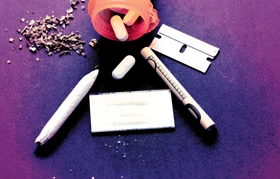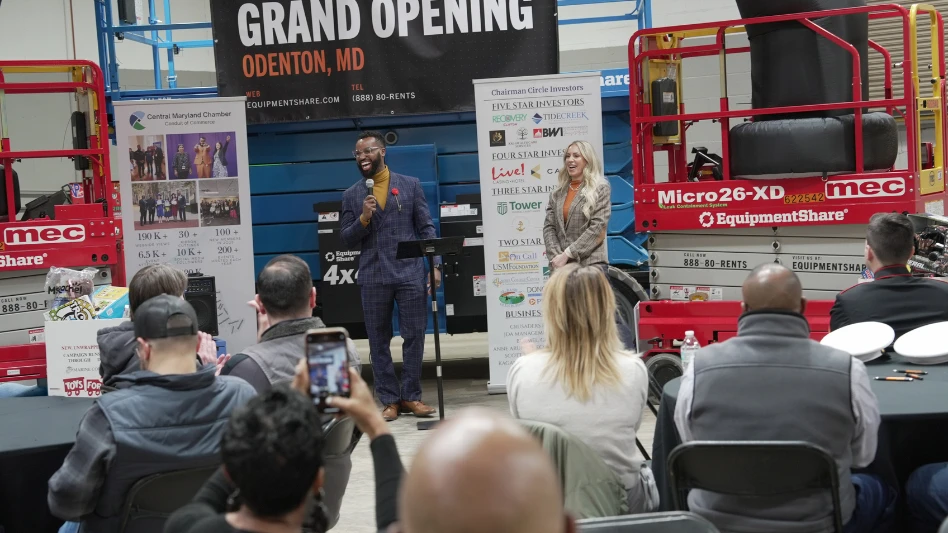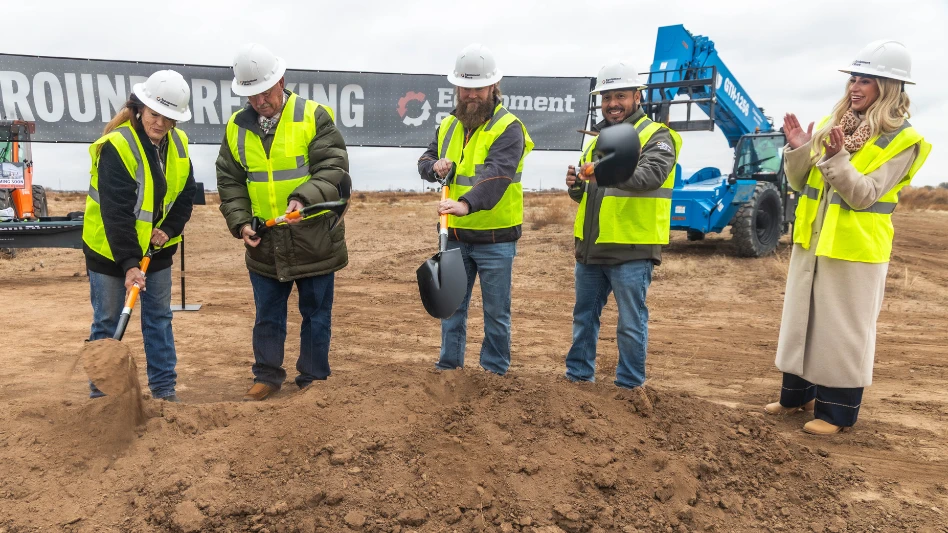
 How well do you really know the people who are operating your equipment? Do you know what the foreman did before he clocked in for work today? How about your secretary? Do you know how this valuable front-person chooses to unwind when out of the office? And does all this even matter?
How well do you really know the people who are operating your equipment? Do you know what the foreman did before he clocked in for work today? How about your secretary? Do you know how this valuable front-person chooses to unwind when out of the office? And does all this even matter?
That depends. When drugs are a part of employees' off-hours, their performance on the job can be seriously affected – and represent a real risk. "The most important thing that a Drug-Free Safety Program does is emphasize safety at our firm," says Dick Gooding, president, Gooding's Nursery & Landscaping in Sherrodsville, Ohio.
Companies that choose to implement pre-employment drug screening or adhere to a robust drug and safety initiative, such as programs sponsored by state Bureau of Workers' Compensation offices, report fewer lost-time injuries and – less measurable – improved employee morale.
Lawn & Landscape spoke with three firms that implemented drug screening and/or criminal background checking to learn how these processes can change a workforce for the better.
Cleaning the house
 When lost-time injuries peaked at 144 days of missed workdays because of work-related injury, Dick Gooding knew his rural Ohio landscaping firm and nursery was in trouble. In 2000, the company clocked eight injuries, and the firm was booted from its workers' compensation group rating program.
When lost-time injuries peaked at 144 days of missed workdays because of work-related injury, Dick Gooding knew his rural Ohio landscaping firm and nursery was in trouble. In 2000, the company clocked eight injuries, and the firm was booted from its workers' compensation group rating program.
Immediately, the cost of workers' compensation coverage doubled, from about $20,000 to $40,000 per year. "Being a small company that was doing about $1 million or less in sales at the time – boy, that was a major financial drain," says Gooding, president of Gooding's Nursery & Landscaping.
Gooding called the Ohio Bureau of Workers Compensation to find out what he could do to salvage his bottom line. A representative visited his office and suggested he joined a safety council, institute a 10-step program that would give the company "points" to reduce its rate and to institute a Drug-Free Safety Program. It was mid-2003, and Gooding's started the plan immediately.
That meant all employees and managers – including family working in the business – had to undergo a drug test at the local medical center. "I said, 'Everyone, including yours truly, is getting tested,'" Gooding says. Right away, a foreman quit. "He said he liked to do cocaine once in a while, so he didn't want (a test) to restrict his freedom," Gooding says. The company lost its secretary, a shock to Gooding. "I thought everything was fine. She chose to leave.
 "That just blew me away – I had no idea I had individuals working for me who were, in my opinion, drug dependent," he continues, noting that after testing began, he learned from employees that many of the job site injuries the company experienced in prior years were related to drug use. "Other employees in the firm knew those (injured) employees were doing drugs," Gooding says. Of course, Gooding did not know that at the time.
"That just blew me away – I had no idea I had individuals working for me who were, in my opinion, drug dependent," he continues, noting that after testing began, he learned from employees that many of the job site injuries the company experienced in prior years were related to drug use. "Other employees in the firm knew those (injured) employees were doing drugs," Gooding says. Of course, Gooding did not know that at the time.
With a full-blown Drug-Free Safety Program in place at the company, Gooding has completely changed the company culture for the better. It's everyone's responsibility to ensure that employees are working safe, and that means working "clean." And, with a policy in place, there is no question as to the fairness of testing. Everyone gets tested post-hire (within a 90-day probationary period), 10 percent of the workforce is tested randomly each year, and supervisors are trained to identify potential problems and reasonable cause justifies a drug test. Plus, Gooding joined a safety council at the local medical center, and he eventually became certified so he can be a drug and safety trainer, teaching the company's regular drug and safety education classes, which count toward the BWC program.
The result of all this: In 2010, the company got its group rating back. And, injuries have drastically reduced, from five injuries in 2003 when the firm started the program, to one medical injury in 2004, one medical injury in 2005, and no claims for the following three years. In 2009 and 2010, the company also filed no claims.
"The safety culture has taken time, but it significantly impacted our bottom line to the point where my workers' compensation rate is much more manageable," Gooding says.
.jpg)
Checking the real story
 When Rob Garpiel envisions exactly what he wants his company to look like, he sees exceptional people: solid, hard-working, talented workers. "We needed a way to level the playing field," he says of the hiring process. "We felt that began with screening people to make sure they weren't on drugs, and then doing a criminal background investigation."
When Rob Garpiel envisions exactly what he wants his company to look like, he sees exceptional people: solid, hard-working, talented workers. "We needed a way to level the playing field," he says of the hiring process. "We felt that began with screening people to make sure they weren't on drugs, and then doing a criminal background investigation."
Perhaps Garpiel is more in tune with what the real-world employment pool looks like because he's a former police officer. He's seen it all. And he doesn't want to hire any of that. "Having a (drug testing and background check) policy in place certainly has made it a lot harder to hire," he says. Just when you think you've got a good candidate, a background check shows otherwise.
"You could be sitting behind the table with a job applicant who is a 20-year-old woman who seems well-rounded, then you find out her drivers' license was suspended for whatever reason," Garpiel says, drawing one example.
Garpiel doesn't want to guess what's really going on with a candidate. He wants the true story. Putting a drug-test and background check policy in place allows him to find out exactly who he could be hiring before he makes a decision. "It has allowed us to do more than judge a book by its cover," he says.
The pre-employment drug screening immediately weeds out candidates before they even apply for the job. Garpiel figures three out of 10 people who call to inquire about a job at his company choose not to go beyond the first interview, when Garpiel tells them the next step is a drug test. "They say, 'I can't do that today,'" Garpiel says. "I ask, 'Well, why not?'"
 Beyond pre-employment drug testing, Garpiel Landscaping also requires post-accident drug screening, which takes place at the local hospital. "If someone gets hurt – and in our business, sooner or later someone will need stitches or X-rays or something – we have the employee do the (drug test) the following day," he says.
Beyond pre-employment drug testing, Garpiel Landscaping also requires post-accident drug screening, which takes place at the local hospital. "If someone gets hurt – and in our business, sooner or later someone will need stitches or X-rays or something – we have the employee do the (drug test) the following day," he says.
As for background checking, first he checks the registry for the state of Michigan, which reveals any misdemeanors and felony convictions. He also uses netdetective.com, which costs about $30 per year and allows Garpiel to perform a national scan on employees. "If you have someone with an employment history in other states, you can look in those states to see if the candidate has any convictions," Garpiel says.
Having a good, clean workforce is important to Garpiel's clients, too, and the company has found a marketing angle to its drug-free policy. When Garpiel meets with a new customer, he talks about the integrity of the firm and its commitment to quality.
"We can offer them documents that show the workers on their properties are not there casing their homes for a break-in," Garpiel says. Well, he doesn't necessarily say this. But he does tell clients, "We respect your property and we respect you offering us the opportunity to earn your business. We take the time and do the due diligence to make sure the people working on your property are good people."

Heading off claims

Mike Hakanson wants to prevent "any problems" before they occur, so two years ago he implemented a drug-testing policy at his company, Lawnscapers in Davenport, Iowa. At the same time, he started background checking as part of the firm's job application process.
If an accident happens on the job, Hakanson wants to know for sure the cause isn't associated with an employee's inability to make a clear-headed decision. "I want to protect the company from anyone getting hurt," he says. "I really like the idea of not having to worry if someone is high on the job site," he adds.
 So when someone responds to a Lawnscapers help-wanted ad, the administrator at the company lets the candidate know that a pre-employment drug test is part of the application process. "If prospects know they are not going to pass a (drug test), they don't show up for an interview," he says. "It saves time on everyone's end, and we can focus on the task at hand: trying to hire a good fit for our company."
So when someone responds to a Lawnscapers help-wanted ad, the administrator at the company lets the candidate know that a pre-employment drug test is part of the application process. "If prospects know they are not going to pass a (drug test), they don't show up for an interview," he says. "It saves time on everyone's end, and we can focus on the task at hand: trying to hire a good fit for our company."
Aside from pre-employment drug testing, Hakanson also instituted post-accident drug testing. And, he has adopted the state's no-smoking policy and does not allow any employee to smoke cigarettes during the work day – that includes lunch breaks. "If they are on the job site, they can't smoke," he says. There's no smoking in vehicles either.
Hakanson says setting up the drug testing policy wasn't difficult, and maintaining it is relatively inexpensive. He pays about $30 for each pre-employment drug test, which is conducted at the local hospital. All prospective team members report to the hospital for their drug test before an official job interview. "After they pass the drug test, then we do the interview to determine if they are a fit for our team," Hakanson says.
As for the background check, the company's administrator manages that process and relies on the state website where public records are available. Both policies are included in the company's employee handbook, and Hakanson emphasizes that the ultimate purpose is to maintain a safe workplace. "We care about our team and their safety," he says.
The author is a frequent contributor to Lawn & Landscape.

Explore the December 2011 Issue
Check out more from this issue and find your next story to read.





